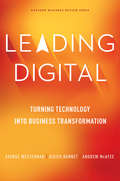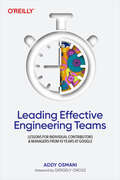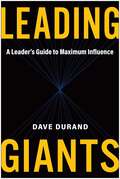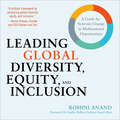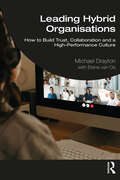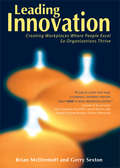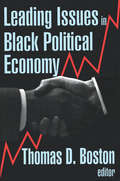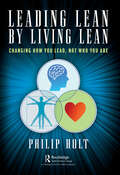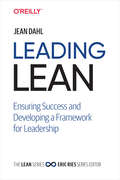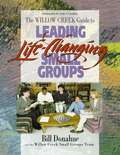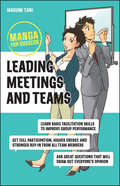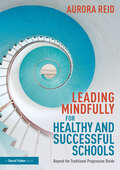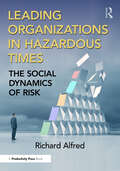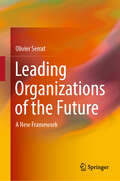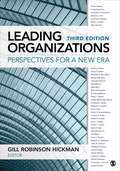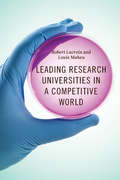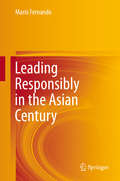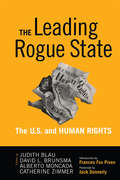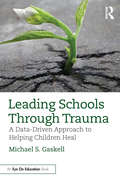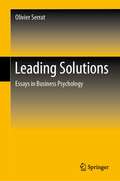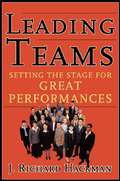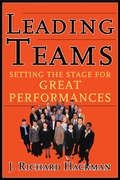- Table View
- List View
Leading Digital: Turning Technology into Business Transformation
by George Westerman Andrew Mcafee Didier BonnetLeading Digital makes the provocative argument that the next imminent phase of digital technology adoption - driven by the convergence of mobility, analytics, social media, cloud computing, and embedded devices - will make everything that’s happened so far look like a prelude. The authors, a trio of highly regarded thought leaders on corporate digital transformation, say changes in the digital realm so far have focused on high tech and media companies - but there’s still a whopping 94% of the business economy that needs to change. This book will show them how. George Westerman of MIT, Didier Bonnet of Capgemini Consulting, and Andrew McAfee, also at MIT, say there is opportunity for these businesses to learn from those that have already mastered the digital landscape. Based on a study of more than 400 large, mainstream firms in every industry around the globe, the authors usefully break down how these organizations have used their own digital transformation to gain strategic, competitive advantage. Readers will learn how these digital leaders have transformed their businesses through smart and rigorous digital investments, and through smart and effective leadership of the change. Leading Digital offers practical, real-life tested frameworks that can be instantly applied. Case studies include Nike, Caesars, Burberry, Asian Paints, Pages Jaunes, Codelco, and more.
Leading Edge Technologies in Fashion Innovation: Product Design and Development Process from Materials to the End Products to Consumers (Palgrave Studies in Practice: Global Fashion Brand Management)
by Young-A LeeThis book offers cutting-edge knowledge on various design and product development related technologies, and applications of these technologies in fashion. Further, it envisions the future of these technologies when designing and engineering apparel-related products. Demonstrating how theory turns into practice, this volume presents the analysis of cases representing a successful collaboration between innovative technology and fashion. These current examples of industry and consumer cases with the use of various technologies will allow readers to fully connect how the industry currently implements these technologies into product design and development process as well as communicating with consumers. This text will serve as a valuable resource to researchers and educators in the fields of supply chain management, branding, marketing, fashion studies, textiles, and product design.
Leading Effective Engineering Teams: Lessons for Individual Contributors and Managers from 10 Years at Google
by Addy OsmaniIn this insightful and comprehensive guide, Addy Osmani shares more than a decade of experience working on the Chrome team at Google, uncovering secrets to engineering effectiveness, efficiency, and team success. Engineers and engineering leaders looking to scale their effectiveness and drive transformative results within their teams and organizations will learn the essential principles, tips, and frameworks for building highly effective engineering teams.Osmani presents best practices and proven strategies that foster engineering excellence in organizations of all sizes. Through practical advice and real-world examples, Leading Effective Engineering Teams empowers you to create a thriving engineering culture where individuals and teams can excel. Unlock the full potential of your engineering team and achieve unparalleled success by harnessing the power of trust, commitment, and accountability.With this book, you'll discover:The essential traits for engineering effectiveness and the pitfalls to avoidHow to cultivate trust, commitment, and accountability within your teamStrategies to minimize friction, optimize career growth, and deliver maximum valueThe dynamics of highly successful engineering teams and how to replicate their achievementsHow to implement a systems thinking approach for everyday problem-solving and decision-makingSelf-advocacy techniques to enhance your team's visibility and recognition within the organization
Leading Giants: A Leader's Guide to Maximum Influence
by Dave DurandNo matter your position or industry, Leading Giants offers proven strategies that will rapidly expand your influence to get you the results you want.It is clear that leaders carry a unique burden. They are guardians, protectors, providers, judges, helpers, servants, counselors, and friends—and only a Giant can be all those at one time. Leaders live and die with the actual results they create, and those results are created with and through the people they lead. Dave Durand spent 35 years founding, leading, and selling companies with more than a billion dollars in combined sales. Having led hundreds of thousands of people, he distills leadership influence in usable terms. Leading Giants illuminates the Four Superpowers of a Leader, how to rapidly expand your influence, and that in order to succeed, strangely, you have to &“think like a criminal.&” In addition to building greatness in yourself, your team, and your organization, Leading Giants will help you: Become a Giant—someone who has unlocked their maximum potential in business and in life Inspire great results in those around you—creating profit and long-term wealth for your business Attract and retain incredible talent (other Giants)—keeping all the best players on your team WIN against your competitors By learning to serve as a firm but compassionate leader in the face of challenges, you will do the right things, the right way, and reap the benefits. Because life and business are full of good people engaging in destructive behavior, influencing people away from vice and into virtue is the key to peace, prosperity, and profits. Filled with personal stories from Durand&’s decades of founding, leading, scaling, and selling businesses, plus actionable lessons readers can use to increase the impact of their leadership, Leading Giants offers a fresh and empowering perspective, helping readers set their sights on true success and providing them a practical guide for the journey. If you want success, extraordinary results, and a winning culture, Leading Giants will show you how.
Leading Global Diversity, Equity, and Inclusion: A Guide for Systemic Change in Multinational Organizations
by Rohini AnandThis book offers five proven principles so multinational companies can advance diversity, equity, and inclusion with a nuanced understanding of local contexts across countries and cultures. It's easy to fall into the trap of using a single-culture worldview when implementing global DEI in organizations. But what makes DEI change efforts successful in one country may have opposite, unintended consequences in another. How do companies find the right balance between anchoring their efforts locally while pushing for change that may disrupt existing power dynamics? This is the question at the heart of global DEI work. Along with practical advice and examples, Rohini Anand offers five overarching principles derived from her own experience leading global DEI transformation and interviews with more than sixty-five leaders to provide a through line for leading global DEI transformation in divergent cultures.Local relevance—understanding markets and acknowledging local beliefs, regulations, and history—is essential for global success. This groundbreaking book explicitly details how to take local histories, laws, and practices into account in DEI transformation work while promoting social justice worldwide.
Leading Hybrid Organisations: How to Build Trust, Collaboration and a High-Performance Culture
by Michael DraytonHybrid working on a large scale arrived suddenly with the COVID-19 pandemic. And it’s here to stay. Going beyond the quick-fix solutions that emerged during the transition, this book takes a deeper, systems approach to leading a hybrid organisation to help managers understand the real, ‘beneath the surface’ issues in hybrid working.Established ways of managing everyday problems, such as workflow, communication and performance management, now seem inadequate when some members of staff are in the office and others are working remotely. In addition to day-to-day management tasks, there are also more complex challenges such as developing a cohesive team and organisational culture and a strong attachment to the organisation. Drawing on contemporary management theory, behavioural science, psychoanalysis and social psychology, the book explains the impacts and how to address areas such as: team and organisational identity; recruitment and retention of talent; personality and hybrid working; team dynamics; performance management; security and insider risk; well-being, burnout and engagement; diversity equality and inclusion; ESG; and handling conflict.This engaging book empowers leaders and managers by enabling them to understand the dynamics of hybrid working, and giving them the tools to influence these processes to improve their effectiveness in the organisation.
Leading Innovation: Creating Workplaces Where People Excel So Organizations Thrive
by Brian Mcdermott Gerry Sexton<p>Learn how to create a culture of perpetual innovation and ensure sustainable excellence. For leaders and managers who believe people are their organization’s most important asset.</p>
Leading Issues in Black Political Economy
by Thomas D. BostonLeading Issues in Black Political Economy brings together the foremost experts on issues ranging from employment, training, and education of African Americans. It also emphasizes macro-economic concerns of business development with special emphasis on long-term trends of black-owned businesses. The work emphasizes welfare considerations in an anti-welfare epoch, and the role of affirmative action now that it is under attack. Attention is given to the role of race in the continuing disparity of income distribution in American society. The highlights of Leading Issues include "An Employment and Business Strategy for the Next Century: A Comment," by Thomas D. Boston; "Long Term Trends and Prospects for Black-owned Business," by Andrew F. Brimmer; "Is the U.S. Small Business Administration a Racist Institution?" by Timothy Bates; "Worker Re-Training and Labor Market Outcomes: A New Focus for Labor Research," by James B. Stewart; "Race, Cognitive Skills, Psychological Capital, and Wages," by Arthur H. Goldsmith, William Darity, Jr., and Jonathan R. Veum; and "Reparations and Public Policy," by Richard F. America. The overall findings suggest that empirical wage equation specifications do matter. The role of psychological capital is critical in the marketplace. Race is indeed an important determinant of wages-especially when the influence of both cognitive skills and psychological capital are included in the wage equation. This volume will be of crucial interest to economists, political scientists, sociologists, and policy analysts studying African-American life. Thomas D. Boston is editor of the Review of Black Political Economy and professor of economics at the Georgia Institute of Technology. He is the co-editor, with Catherine L. Ross, of The Inner City: Urban Poverty and Economic Development in the Next Century, also available from Transaction.
Leading Lean by Living Lean: Changing How You Lead, Not Who You Are
by Philip HoltIn Leading Lean by Living Lean, Philip Holt details and explains what is probably the most important part of becoming a Lean Leader -- living and practicing what you preach. To do this you must believe in what you’re doing, understand what it means and what you need to do, and do it every day. The author, through his engineering background, has fully embraced the Plan-Do-Check-Act (PDCA) model of Deming / Shewhart but has adapted David Bovis’ Believe-Think-Feel-Act (BTFA) model to understand why logic and facts are very often not the principal players in the game of change. In this book, Holt author describes how you can take both the PDCA and BTFA models into account and has sectioned the book into three prime parts: 1. Head -- How you learn and understand the Lean principles and their application. 2. Hands -- How you practice Lean Leadership daily. 3. Heart -- How you internalize and believe in Lean Leadership. Through this book, you, the Lean practitioner, whether aspiring or experienced, will have everything that you need to “lead it,” “do it,” and “live it.” The nature of this book is more “why to” than “how to” – the author knows that he cannot tell you how to lead, do, or live Lean; he can only explain why it is so important and share his knowledge, experiences, failures, and successes. This book isn’t so much a self-help book as a self-reflection book and it can point you in the proper direction, but… the book won’t change you; only you can change you! Essentially, with this book, the author wants those who think of Lean as a toolkit, who believe that Lean can be project managed, or who argue about Lean versus Six Sigma and misunderstand the fundamental depth of impact that true Lean Leadership has on an organization to be disabused of any or all of those notions. This book is aimed at those leaders who seek to experience the full transformative effects of Lean in their organizations and want to practice it at the principle level of deployment. Holt's aim is to help business leaders enhance who they are by changing what they do and the way that they do it
Leading Lean by Living Lean: Changing How You Lead, Not Who You Are
by Philip HoltIn Leading Lean by Living Lean, Philip Holt details and explains what is probably the most important part of becoming a Lean Leader -- living and practicing what you preach. To do this you must believe in what you’re doing, understand what it means and what you need to do, and do it every day. The author, through his engineering background, has fully embraced the Plan-Do-Check-Act (PDCA) model of Deming / Shewhart but has adapted David Bovis’ Believe-Think-Feel-Act (BTFA) model to understand why logic and facts are very often not the principal players in the game of change. In this book, Holt author describes how you can take both the PDCA and BTFA models into account and has sectioned the book into three prime parts: 1. Head -- How you learn and understand the Lean principles and their application. 2. Hands -- How you practice Lean Leadership daily. 3. Heart -- How you internalize and believe in Lean Leadership. Through this book, you, the Lean practitioner, whether aspiring or experienced, will have everything that you need to “lead it,” “do it,” and “live it.” The nature of this book is more “why to” than “how to” – the author knows that he cannot tell you how to lead, do, or live Lean; he can only explain why it is so important and share his knowledge, experiences, failures, and successes. This book isn’t so much a self-help book as a self-reflection book and it can point you in the proper direction, but… the book won’t change you; only you can change you! Essentially, with this book, the author wants those who think of Lean as a toolkit, who believe that Lean can be project managed, or who argue about Lean versus Six Sigma and misunderstand the fundamental depth of impact that true Lean Leadership has on an organization to be disabused of any or all of those notions. This book is aimed at those leaders who seek to experience the full transformative effects of Lean in their organizations and want to practice it at the principle level of deployment. Holt's aim is to help business leaders enhance who they are by changing what they do and the way that they do it
Leading Lean: Ensuring Success and Developing a Framework for Leadership
by Jean DahlCompanies from startups to corporate giants face massive amounts of disruption today. Now more than ever, organizations need nimble and responsive leaders who know how to exploit the opportunities that change brings. In this insightful book, Jean Dahl, a senior executive and expert in the Lean mindset and its methods, demonstrates why you need to embrace Modern Lean principles and thinking to redefine leadership in this age of digital disruption in order to continuously evolve the Lean enterprise.Drawing on nearly three decades of corporate and consulting experience, Ms. Dahl lays out a new holistic framework for developing Modern Lean leaders. Through personal experiences and compellingreal-world case studies, she explains specific steps necessary for you and your company to proactively understand and respond to change.Understand the leadership challenges Lean leaders face in our 21st century global economyExplore the six dimensions of the Modern Lean Framework™Learn and apply the nine steps necessary to become a Lean leaderUse Modern Lean methods to build a culture of continuous learning that can be sustained and maintained within your organizationSeize competitive advantage by embracing Modern Lean to tbuild an enterprise that understands how to respond to disruption
Leading Life-Changing Small Groups: Over 225,000 Copies Sold (Groups That Grow Ser.)
by Bill DonahueNow revised, a comprehensive leadership tool for small group leaders and for churches seeking to structure their ministries around small groups.
Leading Meetings and Teams: Manga for Success (Manga for Success)
by Masumi TaniLEARN TO FACILITATE PRODUCTIVE MEETINGS AND BUILD HIGH-PERFORMING TEAMS WITH MANGA FOR SUCCESS! Shigeo, an employee of a building material manufacturing company, is sent to a regional office to improve sales. Along the way, he encounters challenges engaging with the local team but, with advice from a helpful facilitation specialist, Mayumi, he eventually learns to build the skills of his colleagues and cobble together a high-performing team. You’ll also learn about: How to run an effective business meeting How to productively use a variety of meeting tools Facilitating fruitful brainstorming sessions Using effective communication to lead your team to success Leading Meetings and Teams is a practical and hands-on book that will earn a place on the bookshelves of managers, executives, and early-career professionals everywhere. Find out why the Manga For Success series—now available in English for the first time—is so popular in Japan, Korea, and beyond.
Leading Mindfully for Healthy and Successful Schools: Beyond the Traditional Progressive Divide
by Aurora ReidSchools are increasingly expected to improve mental health and well-being and academic outcomes for students. However, the debate about well-being and school improvement is often unhelpfully polarised with attachment-informed and restorative-justice approaches pitted against structures and systems that instil discipline. This book seeks to take a ‘middle way’, looking at how these perspectives might complement one another, and argues that healthy teacher-student relationships require an adult that is both attuned to their students’ needs and able to hold boundaries with them. Setting out conception of leadership that is clear, compassionate, and self-aware, Leading Mindfully for Healthy and Successful Schools draws on therapeutic and educational research to identify key strategies for improving well-being across schools that are sustainable in the long term. This book is divided into three sections – Leading Yourself, Leading School Culture and Leading in the Classroom – and the chapters cover the following: Interpersonal neurobiology and the role that attachment plays in our work Self-care and how this can be built into school life The role of structures and relationships Building trust Radical inclusion Building calm and effective classrooms Healthy adult authority Including reflective activities, thought-provoking case studies and key takeaways for every chapter, this is an essential read for all current and aspiring school leaders.
Leading Organizations in Hazardous Times: The Social Dynamics of Risk
by Richard AlfredDoes your organization have the capacity to respond to risk it has not anticipated or prepared for? Is its approach to risk explicit and understood by employees? Does it have a robust risk culture? Do employees take responsibility for managing risk? If your response to these questions is guarded or uncertain, this book will have value for you and your organization.Organizations and leaders in a widening risk environment face four realities which challenge their ability to manage risk: (1) the two-dimensional nature of risk—risk itself and behavior in response to risk, (2) the diversity of attitudes and behavior in relationship to risk, (3) the influence on behavior of cognitive, psychological and contextual factors that are part of social dynamics and (4) the compounding effect of social dynamics that make risk difficult to manage. These realities add up to a conundrum: The challenge for organizations and leaders lies not in risk itself but in social dynamics that shape behavior in response to risk.Whether triggered by an internal problem or external event, risk management failures often result from a lack of understanding of causative factors and behavior in response to risk. Effective leaders make risk a core part of their agenda. They put people at the center of strategy and face challenges head-on that impact their organizations’ ability to manage risk. Among the challenges are:◾ the toll on organizational resources of a growing array of risk factors◾ risk "blind spots" in the organization warranting attention◾ cultural weaknesses and vulnerabilities elevating exposure to risk◾ employee disengagement from risk and responsibility for managing it,◾ variation in attitudes and behavior that make risk difficult to detect and mitigate,◾ turning risk into advantage by envisioning it as an opportunity or strength in contrast to a threat or weakness.Leading Organizations in Hazardous Times: The Social Dynamics of Risk builds capability in risk management by enhancing leader understanding of risk behavior and factors contributing to risk culture. It encourages leaders to invest in continuous learning to navigate asymmetries of attitude and behavior, managing, and leadership style that underlie organizational success and failure.
Leading Organizations of the Future: A New Framework
by Olivier SerratThis book delves into uncharted territory, offering an extensive exploration of the future of organizations and how they should be led. In a world characterized by volatility, uncertainty, complexity, and ambiguity (VUCA), traditional organizational paradigms no longer suffice. Instead, this book introduces a visionary framework for the leadership of tomorrow's organizations, one that adapts to the unique demands of each situation.Drawing on insights from interviews with 12 subject matter experts, this research-driven work challenges the relevance of twentieth-century leadership styles in the VUCA era. The experts highlight the importance of metagovernance, complexity leadership, and sense-making as essential components of navigating the ever-evolving landscape of modern organizations.Central to this exploration is the question of how to develop a context-specific leadership management framework capable of guiding organizations through simple, complicated, complex, and chaotic contexts. This book not only identifies the pressing need for such a framework but also provides a comprehensive blueprint for its creation.This book is a valuable resource for those who wish to understand the future of organizational leadership and how it can adapt to the challenges and opportunities of the twenty-first century. It not only reshapes the current understanding of leadership but also offers practical insights that will shape the organizations of the future.
Leading Organizations: Perspectives for a New Era (Third Edition)
by Gill Robinson HickmanThe comprehensiveness of this text, coupled with the opportunity to learn from the most prominent theorists and leadership scholars today, makes this an indispensable text for courses in leadership.
Leading Positive Organizational Change: Energize - Redesign - Gel
by Bart TkaczykAlthough many organizations see the need to transform and to reinvent themselves, for far too many leaders, ‘change’ and ‘failure’ are virtual synonyms. In fact, most organizational change efforts fail. But that needn’t be the case, and help is at hand. Leading Positive Organizational Change, an alternative way to think about organizational change and development, is a strategic, learnable discipline that can re-energize and re-imagine your enterprise, and release the potential for change – delivering a positive, creative future and breakthrough bottom-line results. Written by an award-winning expert in positive organization development and change leadership, this book provides executives, change leaders, and change leadership teams with a step-by-step guide for collaboratively crafting and executing a change strategy that aligns with organizational objectives so as to fuel their future. With a strong science-backed and field-tested ‘how to’ approach, and with a radical focus on organizational positivity, super-flexibility and renewal, collective design thinking and applied imagination, this highly practical book features: A ToolBox of 30 powerful, imaginative (and time-saving!) tools for you to use in practicing leading positive organizational change and carrying through your change program – with example templates and worksheets, concise notes and ideas from numerous complex global projects. Lead-ins to each chapter that are a fundamental feature of the book, representing a springboard to a chapter and serving the purpose of awakening interest in the topic. Dialogic Reflection for Professional Team Development, at the start of each chapter, that enables you (and your team as a whole) to reflect on and discuss some thought-provoking questions, linking to the chapter and helping to contextualize your learning. Industry Snapshots that explore current issues and trends in one of the fastest-growing professions and industries – coaching and consulting. Windows on Practice that demonstrate how issues are applied in real-life business situations, offering a range of interesting topical illustrations of positive change leadership in practice, relating the core concepts of the book to real-world settings. Summary Propositions, at the end of each chapter, that recap and reinforce the key takeaways from the chapter. References to help you take your learning and development further. Tkaczyk’s engaging, reflective, task-based book equips the change leader and leadership teams with the skills needed to navigate chaos and the unexpected, to renew your business and create winning change. This action-based workbook can be used in a variety of business settings, among others, executive leadership team meetings, organization development and change consulting, design-led strategy retreats, human resource development consultancy, executive 1:1 and team coaching, leadership boot camps, design thinking workshops and sprints, innovation labs, and executive education and MBA courses – as a handy additional text in either an organization development and change or human resource management class. It can also be used in a flexible strategic transformation program – with the flow of the change execution process mapped within the context of a specific change initiative.
Leading Research Universities in a Competitive World: Autonomous Institutions In A Competitive Academic World
by Robert Lacroix Louis MaheuAlthough research universities represent only fifteen to twenty per cent of national university systems worldwide, they provide the bulk of fundamental research and doctoral training. Written by two veteran university administrators, Leading Research Universities in a Competitive World focuses on the international ranking systems’ uneven distribution of these institutions in industrialized countries, and the organizational factors affecting their efficacy, prestige, and performance. Robert Lacroix and Louis Maheu argue that research universities, despite being embedded within academia’s mindset and rules, have to master market influences and relationships in order to produce new knowledge and attract the rare talent and limited financial assets required for successful research and education activities. Comparing the configuration of higher education systems in the US, UK, France, and Canada, the authors outline the ways in which research universities, which need public funding and have to engage diverse forms of state regulation, may possess sufficient autonomy to behave as independent actors. They demonstrate that reaching an equilibrium between autonomy and state regulation, though challenging, is an essential element in the success of high performing research universities. Leading Research Universities in a Competitive World illuminates the operation of these institutions through substantive quantitative and qualitative datasets to address the fundamental question of why universities perform differently.
Leading Responsibly in the Asian Century
by Mario FernandoThe book is one of the first to focus on responsible leadership in the contemporary Asian century context. It adopts a unique context driven social innovation based responsible leadership approach to explain how context can impact and shape the theory and practice of responsible leadership. This unique work will strongly appeal to a broad spectrum of researchers and scholars across disciplines with a particular interest in the interplay between leadership, responsibility and ethics. As Asia's influence on the global economy continues to grow in the Asian Century, this book offers a culturally integrated view of how the shift in economic power to Asia and the rising new global economic order can influence the theory and practice of responsible leadership. The book focuses particularly on the Asian century opportunities and challenges as a strong contextual factor that shapes the 'responsibility' of responsible leadership. The scholarly literature on the topic, the case studies developed through interviews and secondary data, and author's corporate experiences in the Asia-Pacific region in leading organisations are key sources for the book's assertions. It fills an important gap in the literature on how Asian cultural factors might influence the predominantly Western developed responsible leadership theory and practice. This book covers key topics including the moral basis for responsibility, theory and practice of responsible leadership, Asian challenges to responsible leadership, and socially innovative responsible leadership. "Fernando's book provides a fresh and novel perspective on how evolutionary changes in economic power between Asia and the rest of the world undoubtedly will affect the practice of responsible leadership. He examines varying views on responsible leadership across cultures, demonstrating how Asian and Western leadership styles have evolved as our economy continues to become more globally integrated. " Prof. Laura Pincus Hartman Director, Susilo Institute for Ethics in the Global Economy Boston University, Questrom School of Business, Boston, USA "There is little doubt that this is the Asian Century and that economic and political influences from the east will increase. But so too may cultural, ethical and even religious influences. It is therefore important that researchers understand these significant changes. In this book Mario Fernando gives us an insight into what this means for responsible leadership. It is primarily an excellent work of scholarship, written for academics who teach and research in this area by someone who knows Asian business and culture from the inside. But it will also reward careful study by practicing leaders and those who are the potential leaders of the future. " Professor of Business Ethics, Geoff Moore Durham Business School Durham University, UK
Leading Rogue State: The U.S. and Human Rights
by Catherine Zimmer Judith R. Blau David L. Brunsma Alberto MoncadaMost Americans would be surprised to learn that their government has declined to join most other nations in UN treaties addressing inadequate housing, poverty, children's rights, health care, racial discrimination, and migrant workers. Yet this book documents how the U.S. has, for decades, declined to ratify widely accepted treaties on these and many other basic human rights. Providing the first comprehensive topical survey, the contributors build a case and specific agendas for the nation to change course and join the world community as a protector of human rights.
Leading Schools Through Trauma: A Data-Driven Approach to Helping Children Heal
by Michael S. GaskellLeading Schools Through Trauma is a data-driven resource for education leaders and administrators preparing to help students heal from acute traumas. Traumatizing experiences are inevitable and cyclical, and we see them at individual, local and large-scale levels. As a school leader you need concrete tools to help learners flourish in their wake, especially amid the challenges of our current moment. This book offers a strategic approach to sustaining community wellness and stability, using real-time, short-term data sets accessible to teachers, and guiding students toward incremental, progressive goal-setting. Evidence-based practices for recognizing traumas, scaling formative assessments and providing teachers with problem-based professional development will help you and your staff develop growth plans that are collaborative with and individualized for students.
Leading Solutions: Essays in Business Psychology
by Olivier SerratThis book on business psychology—particularly organizational leadership—crosses industries, continents, and business environments: it includes 45 précis on emerging theories of leadership; ethical and cultural considerations; group and team leadership; leadership self-development; management philosophy and practice; organizational diagnosis and cultural dynamics; personality and lifespan in the workplace; professional development; qualitative research methods; psychological, socio-cultural, and political dimensions of organizations; the role of technology in organizations; strategic change management; and systems theory. The material ranges widely but is pithy: each précis offers in easy bites the latest "take" on the subject, drawing from popular textbooks, recommended readings, case studies, group exercises, personal experience, and self-reflection; each was written as a key to understanding and change with an eye to re-imagining leadership in the 21st century. Both rigorously researched and entertaining, this book addresses the fast-changing realities of organizational leadership in domestic and international settings across the private, public, and nonprofit sectors: it will serve as a valuable quick-access resource for practitioners and students.
Leading Teams: Setting the Stage for Great Performances
by J. Richard HackmanHackman (social and organizational psychology, Harvard U. ) identifies the factors of being a team leader that will enable a team to work together efficiently to achieve organizational goals. He suggests that five conditions are necessary: having a real team, a compelling direction, an enabling team structure, a supportive organizational context, and expert team coaching. He integrates insights from interviews with team leaders with concepts from the social sciences.
Leading Teams: Setting the Stage for Great Performances
by J. Richard HackmanRichard Hackman, one of the world's leading experts on group and organizational behavior, argues that teams perform at their best when leaders create conditions that allow them to manage themselves effectively. Leading Teams is not about subscribing to a specific formula or leadership style, says Hackman. Rather, it is about applying a concise set of guiding principles to each unique group situation--and doing so in the leader's own idiosyncratic way. Based on extensive research and using compelling examples ranging from orchestras to airline cockpit crews, Leading Teams identifies five essential conditions--a stable team, a clear and engaging direction, an enabling team structure, a supportive organizational context, and the availability of competent coaching--that greatly enhance the likelihood of team success. The book offers a practical framework that leaders can use to muster personal skills and organizational resources to create and sustain the five key conditions and shows how those conditions can launch a team onto a trajectory of increasing effectiveness. Authoritative and astutely realistic, Leading Teams offers a new and provocative way of thinking about and leading work teams in any organizational setting.
